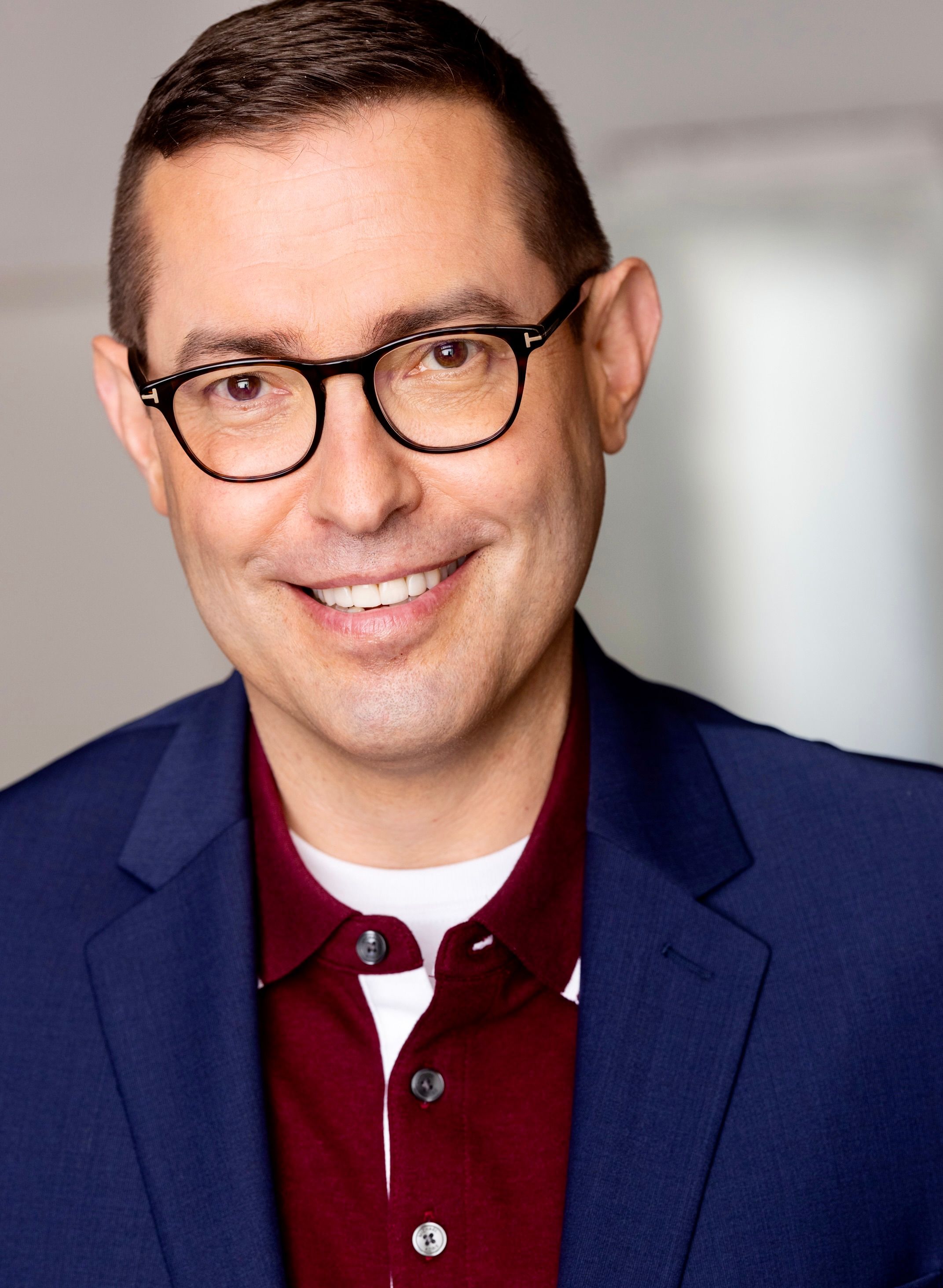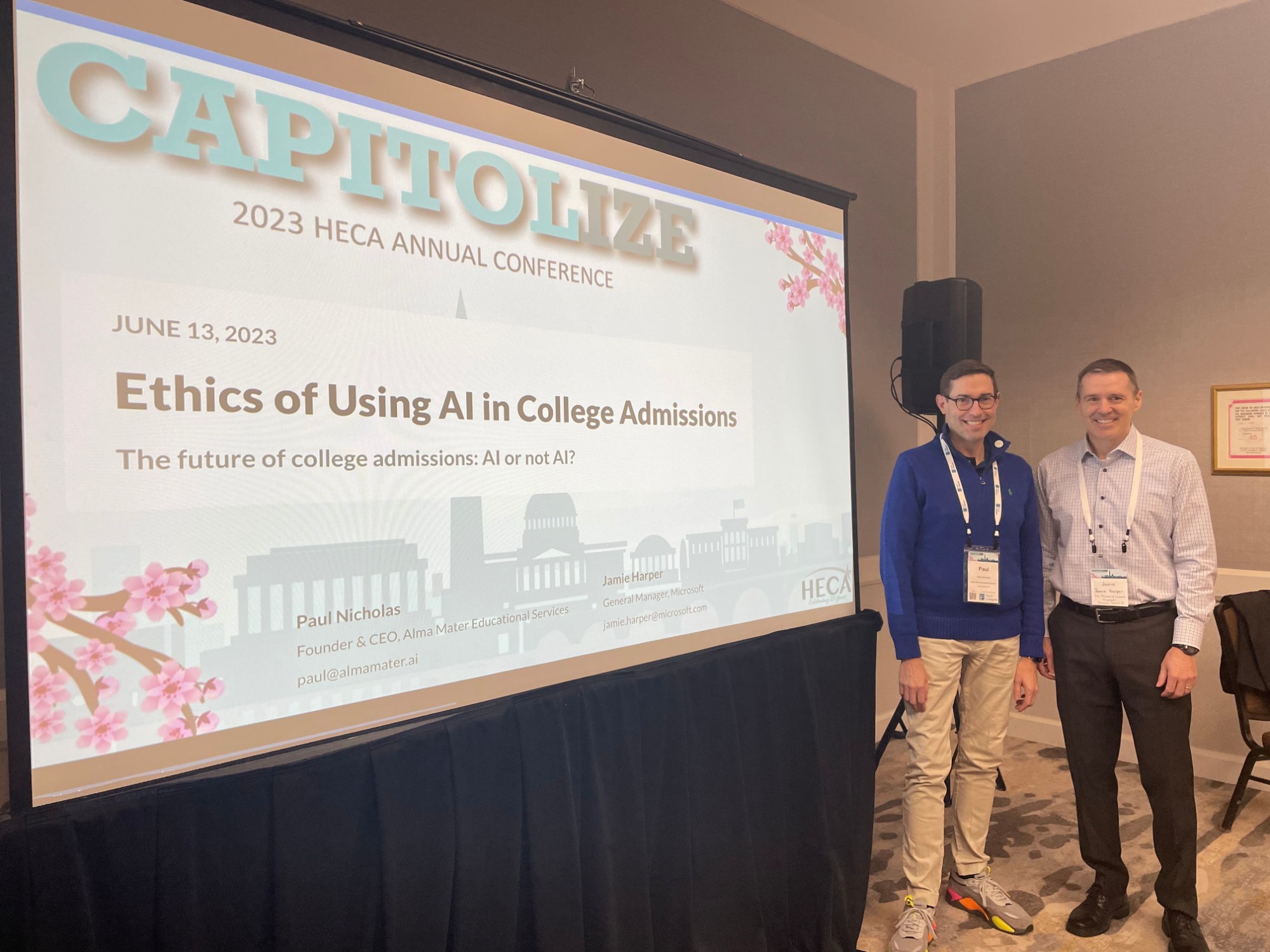Adorning the wall of Paul Nicholas' home office is an array of clocks with various time zones representing the students he mentors around the globe, a string of university pennants, and memorabilia from the latest tech conference he’s attended. All of which he says are intentional.
“It’s for my students,” he says. “I want them to see that I’m intentional about my passions and that anything is possible.”

Paul Nicholas, CEO and Founder of Alma Mater. (Photo: Nicholas)
He’s a current student in TC’s Communications, Media, Learning, Technology, and Design (CMLTD) program, and when he’s not doing a deep dive on the latest developments in artificial intelligence, Nicholas spends his time mentoring students through his self-startup college counseling business, Alma Mater.
We sat down with Nicholas to hear more about what he’s learned so far during his time at Teachers College and, in turn, how he’s using it to inspire his work through Alma Mater.
Putting Theory into Practice
It was in class with TC’s Jin Kuwata where Nicholas learned he could apply his diverse interests in education technology to his counseling work.
The group explored how traditional learning often emphasizes memorization and redundancy over creativity and challenge, and designed a comprehensive social media-based learning experience for students at Harlem Renaissance High School to help them engage better with their local Harlem history. By becoming investigative journalists through platforms like Instagram and TikTok, students were tasked with exploring Harlem's past using geotagging, hashtags, and digital storytelling.
“We tend to think of social media as a technology largely meant to entertain. However, we are becoming more aware of its educational potential and its roles in research,” shares Nicholas. “Often, learning is set up in ways that test student’s ability to memorize and recall facts, rather than drawing meaningful connections with the learning materials themselves,” he explains. “It was fulfilling to see this type of learning be so successful, and I’m already exploring ways to translate social media learning into my own practice.”
Inspired by Innovation
According to a recent survey conducted by Yahoo Finance, 71% of college students agree education technology increases their engagement with learning and course materials.
So, for Nicholas, staying informed on these latest developments is critical. He became better acquainted with artificial intelligence (AI) and learning outcomes in Joey Lee’s Ethics and Technology course and, in turn, applied what he was learning in real time to his counseling practice.
"One of the first things that I ask students to do during my onboarding process is create their own avatar using a generative AI tool,” he explains. “This way, they can see something on the other side of the screen that not only represents them but that they had a hand in creating.”
This approach aims to familiarize students with AI in a way that empowers them while evoking emotion and curiosity. And more often than not, students are more inclined to stay engaged. “The excitement, the magic behind using AI could potentially change how we facilitate classroom learning experiences. I’m already seeing its success in the college counseling space.”
But he’s discovering there's more to AI than just its tech-savvy appeal. Inspired by Lee, Nicholas conducted a deep dive into the ethical concerns of AI and its impact on higher education for his final research project.
“The research I’m doing at Teachers College is far bigger than my degree. It’s developing a shared wealth of information for my students,” he shares, noting that he learned about several ethical pain points, from student privacy to inclusive applications. “I have a responsibility to use what I’m learning and pay it forward.”
And just a year later, he was invited to share his timely research at HECA 2023, a conference held by the Higher Education Consultants Association. His work not only drew interest among his colleagues but also the attention of Jamie Harper, Microsoft's Vice President of U.S. Education. The two presented together, with Nicholas gaining “valuable insights” from Harper that he'll carry into the future.
Nicholas (left) and Harper (right) present at HECA 2023. (Photo: Nicholas)
Looking into the (Digital) Future
Nicholas envisions a multitude of possibilities when it comes to expanding his work through Alma Mater.
He’ll be joining forces with educational leaders across the globe in an exciting new venture, the AI in Education Fellowship, which aims to explore the intersection of AI and learning outcomes. “I’m excited to connect with other educators from across the world and not only bridge connections with them but learn from them, too,” he explains. “How are we using the same technologies? How can we continue to transform outcomes for students?”
He hopes to weave the fellowship experience through his final capstone project next semester. “I’ve learned so much at TC and it has propelled me to keep creating, keep investigating and most importantly, keep inspiring” he shares. “My hope is to create “Alma Mater AI,” where students will create their own individualized learning experiences, leveraging the power of tech and predictive learning analytics, to craft their very own college preparation experience.”
